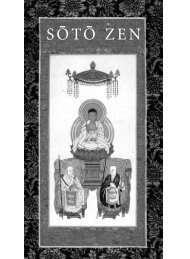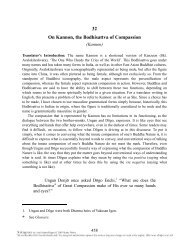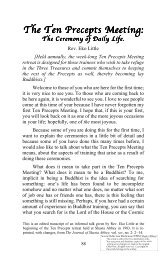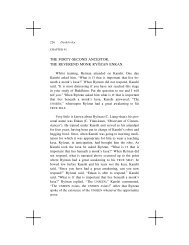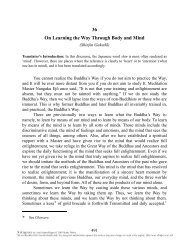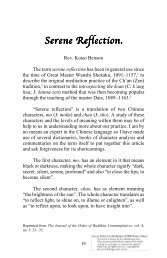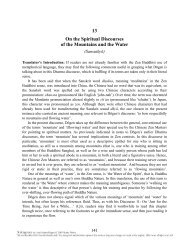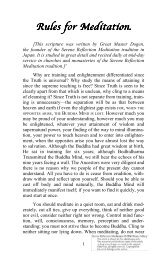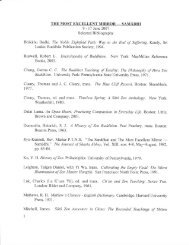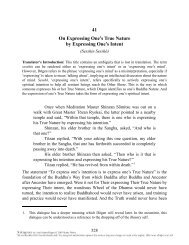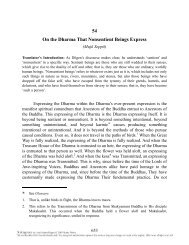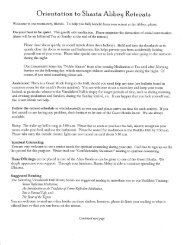11 On 'Just for the Time Being, Just for a While, For ... - Shasta Abbey
11 On 'Just for the Time Being, Just for a While, For ... - Shasta Abbey
11 On 'Just for the Time Being, Just for a While, For ... - Shasta Abbey
Create successful ePaper yourself
Turn your PDF publications into a flip-book with our unique Google optimized e-Paper software.
<strong>11</strong><br />
<strong>On</strong> ‘<strong>Just</strong> <strong>for</strong> <strong>the</strong> <strong>Time</strong> <strong>Being</strong>,<br />
<strong>Just</strong> <strong>for</strong> a <strong>While</strong>,<br />
<strong>For</strong> <strong>the</strong> Whole of <strong>Time</strong> is <strong>the</strong> Whole of Existence’<br />
(Uji)<br />
Translator’s Introduction: “Uji” is Dōgen’s discourse on <strong>the</strong> significance of anatta and<br />
anicca—<strong>the</strong> Buddhist terms <strong>for</strong> ‘no permanent, abiding self ’ and ‘continual change’—and <strong>the</strong>ir<br />
application to treading <strong>the</strong> paths of Right Understanding and Right Thought. It is not, strictly<br />
speaking, a discourse, <strong>for</strong> Dōgen gave <strong>the</strong> text to his monks in written <strong>for</strong>m, which suggests that<br />
he intended it to be read over and studied carefully, ra<strong>the</strong>r than to be absorbed by hearing it only<br />
once.<br />
Because it is linguistically possible to translate <strong>the</strong> title as ‘<strong>Being</strong> and <strong>Time</strong>’, some modern<br />
scholars have been led to assume that Dōgen was engaging in a <strong>for</strong>m of philosophical<br />
speculation akin to that of some Western existentialists. Such an approach, however, would seem<br />
counter to <strong>the</strong> purpose behind a discourse given by a Buddhist Master, since speculative<br />
thinking—philosophical or o<strong>the</strong>rwise—is a type of mentation that trainees are working to<br />
disengage <strong>the</strong>mselves from so that <strong>the</strong>y may progress towards realizing spiritual Truth, which<br />
lies beyond <strong>the</strong> reaches of speculation.<br />
The key term, which is presented as <strong>the</strong> title, has meanings which no single English<br />
rendering fully encompasses. To begin with, uji (<strong>the</strong> Japanese pronunciation of <strong>the</strong> Chinese youshih)<br />
has long been a common, everyday phrase in China, as it has been <strong>for</strong> <strong>the</strong> Japanese when<br />
read as aru toki, encompassing in both languages such English equivalents as ‘just <strong>for</strong> <strong>the</strong> time<br />
being’, ‘<strong>the</strong>re is a time when’, ‘at some time’, ‘now and <strong>the</strong>n’, and <strong>the</strong> like. During his<br />
presentation, Dōgen also explores <strong>the</strong> two components from which <strong>the</strong> word uji is made, drawing<br />
examples of <strong>the</strong>ir usage from everyday Japanese. The first half (u) refers to ‘existence’ or<br />
‘being’; <strong>the</strong> second (ji) has a variety of close English equivalents, including ‘time’, ‘a time’,<br />
‘times’, ‘<strong>the</strong> time when’, ‘at <strong>the</strong> time when’ (as well as ‘hour’ or ‘hours’ when used with a<br />
number) or as signifying what is temporal (‘sometime’, ‘<strong>for</strong> a time’, etc.). The phrase aru toki<br />
has already appeared with some frequency in several of Dōgen’s earlier discourses, particularly<br />
as a phrase in an extended kōan story to signal that an important event is about to happen, such<br />
as a one-to-one exchange with a Master that will trigger <strong>the</strong> disciple’s realization of what Truth<br />
is. In this context, it conveys <strong>the</strong> sense of ‘and <strong>the</strong>n, one day’.<br />
Underlying <strong>the</strong> whole of Dōgen’s presentation is his own experience of no longer being<br />
attached to any sense of a personal self that exists independent of time and of o<strong>the</strong>r beings, an<br />
experience which is part and parcel of his ‘dropping off of body and mind’. From this<br />
perspective of his, anything having existence—which includes every thought and thing—is<br />
inextricably bound to time, indeed, can be said to ‘be time’, <strong>for</strong> <strong>the</strong>re is no thought or thing that<br />
exists independent of time. <strong>Time</strong> and being are but two aspects of <strong>the</strong> same thing, which is <strong>the</strong><br />
106
Shōbōgenzō: <strong>On</strong> ‘<strong>Just</strong> <strong>for</strong> <strong>the</strong> <strong>Time</strong> <strong>Being</strong>, <strong>Just</strong> <strong>for</strong> a <strong>While</strong>…’ 107<br />
interrelationship of anicca, ‘<strong>the</strong> ever-changing flow of time’ and anatta, ‘<strong>the</strong> absence of any<br />
permanent self existing within or independent of this flow of time’. Dōgen has already voiced<br />
this perspective in Discourse 1: A Discourse on Doing <strong>On</strong>e’s Utmost in Practicing <strong>the</strong> Way of <strong>the</strong><br />
Buddhas (Bendōwa), and in Discourse 3: <strong>On</strong> <strong>the</strong> Spiritual Question as It Manifests Be<strong>for</strong>e Your<br />
Very Eyes (Genjō Kōan), where he discussed <strong>the</strong> Shrenikan view of an ‘eternal self ’ and <strong>the</strong><br />
Buddhist perception of ‘no permanent self ’.<br />
In <strong>the</strong> present discourse, Dōgen uses as his central text a poem by Great Master Yakusan<br />
Igen, <strong>the</strong> Ninth Chinese Ancestor in <strong>the</strong> Sōtō Zen lineage. In <strong>the</strong> Chinese version, each line of<br />
this poem begins with <strong>the</strong> word uji, which functions to introduce a set of couplets describing<br />
temporary conditions that appear to be contrastive, but which, in reality, do not stand against<br />
each o<strong>the</strong>r. These conditions comprise what might be referred to as ‘an I at some moment of<br />
time’; this is a use of <strong>the</strong> word ‘I’ that does not refer to some ‘permanent self ’, abiding<br />
unchanged over time (as <strong>the</strong> Shrenikans maintained) but to a particular set of transient conditions<br />
at a particular time. In o<strong>the</strong>r words, <strong>the</strong>re is no permanent, unchanging ‘Yakusan’, only a series<br />
of ever-changing conditions, one segment of which is perceived as ‘a sentient being’, which is,<br />
<strong>for</strong> convenience, conventionally referred to as ‘Yakusan’. Both Yakusan and Dōgen understand<br />
uji (in its sense of ‘that which exists at some time’) as a useful way of expressing <strong>the</strong> condition<br />
of anatta, and in this sense it is used to refer to a state of ‘being’ that is nei<strong>the</strong>r a ‘permanent<br />
self ’ nor something separate from ‘o<strong>the</strong>r’; it is <strong>the</strong> ‘I’ referred to in one description of a kenshō<br />
experience (that is, <strong>the</strong> experiencing of one’s Buddha Nature) as ‘<strong>the</strong> whole universe becoming<br />
I’. Hence, when <strong>the</strong> false notion of ‘having a permanent self ’ is abandoned, <strong>the</strong>n what remains is<br />
just uji, ‘<strong>the</strong> time when some <strong>for</strong>m of being persists’.<br />
After presenting Yakusan’s poem, Dōgen focuses on that aspect of <strong>the</strong> poem that does not<br />
deal with metaphors, images, symbols, etc., and which is <strong>the</strong> one element in <strong>the</strong> poem that<br />
readers are most likely to pay small heed to: <strong>the</strong> phrase uji itself. His opening statement<br />
encapsulates <strong>the</strong> whole of what he is talking about in this text, namely: “The phrase ‘<strong>for</strong> <strong>the</strong> time<br />
being’ implies that time in its totality is what existence is, and that existence in all its occurrences<br />
is what time is.”<br />
Dōgen <strong>the</strong>n begins to ‘unravel’ this statement, describing not only its implications but also its<br />
applications to practice. The points that he takes up are dealt with as <strong>the</strong>y come to him, as <strong>the</strong>y<br />
‘flow <strong>for</strong>th’. There<strong>for</strong>e, he talks about ‘time’ <strong>for</strong> <strong>the</strong> time being, and <strong>the</strong>n talks about ‘existence’<br />
<strong>for</strong> <strong>the</strong> time being, and <strong>the</strong>n goes back to ‘time’ just <strong>for</strong> a while be<strong>for</strong>e moving on to some o<strong>the</strong>r<br />
aspect just <strong>for</strong> a while. In o<strong>the</strong>r words, his text is not only about uji, it is written from <strong>the</strong><br />
perspective of one who lives uji, and who also writes “Uji” so that <strong>the</strong> very way in which he<br />
presents his discussion reflects what uji is about. That is to say, he holds onto nothing as<br />
absolute, <strong>for</strong> all that is phenomenal—that is, every thought and thing that ever arises—is just <strong>for</strong><br />
<strong>the</strong> time being.<br />
Within <strong>the</strong> original text, <strong>the</strong>re are sudden, unexpected shifts, as though Dōgen were<br />
deliberately trying to help his readers bypass or short-circuit a purely intellectual comprehension<br />
of what he is saying in order to catch a glimpse of that state of being which Dōgen himself had<br />
already reached. To help <strong>the</strong> present-day reader keep from making unintentional links between<br />
sentences that appear in sequence but which take up different points, Dōgen’s text has been<br />
divided accordingly.
Shōbōgenzō: <strong>On</strong> ‘<strong>Just</strong> <strong>for</strong> <strong>the</strong> <strong>Time</strong> <strong>Being</strong>, <strong>Just</strong> <strong>for</strong> a <strong>While</strong>…’ 108<br />
Although <strong>the</strong> entire discourse contains a number of remarks that may require some reflection<br />
to penetrate, near <strong>the</strong> end of his discourse Dōgen has an extended discussion that may prove<br />
daunting to some readers because of its succinctness. To make what is being said <strong>the</strong>re more<br />
accessible, paraphrases have been supplied in <strong>the</strong> footnotes, which make explicit in English what<br />
is implicit in <strong>the</strong> original.<br />
Readers who find it helpful to refer to <strong>the</strong> Introduction and footnotes may find it rewarding to<br />
reread just <strong>the</strong> text of “Uji”, <strong>for</strong> <strong>the</strong>re are aspects of this discourse, in particular, that may well<br />
open up <strong>for</strong> <strong>the</strong>m through encountering <strong>the</strong> flow of Dōgen’s presentation without interruptions.<br />
A <strong>for</strong>mer Buddha once said in verse:<br />
Standing atop a soaring mountain peak is <strong>for</strong> <strong>the</strong> time<br />
being<br />
And plunging down to <strong>the</strong> floor of <strong>the</strong> Ocean’s abyss is<br />
<strong>for</strong> <strong>the</strong> time being;<br />
<strong>Being</strong> triple-headed and eight-armed is <strong>for</strong> <strong>the</strong> time being<br />
And being a figure of a Buddha standing sixteen feet tall<br />
or sitting eight feet high is <strong>for</strong> <strong>the</strong> time being;<br />
<strong>Being</strong> a monk’s traveling staff or his ceremonial hossu is<br />
<strong>for</strong> <strong>the</strong> time being<br />
And being a pillar supporting <strong>the</strong> temple or a stone<br />
lantern be<strong>for</strong>e <strong>the</strong> Meditation Hall is <strong>for</strong> <strong>the</strong> time<br />
being;<br />
<strong>Being</strong> a next-door neighbor or a man in <strong>the</strong> street is <strong>for</strong><br />
<strong>the</strong> time being<br />
And being <strong>the</strong> whole of <strong>the</strong> great earth and boundless<br />
space is <strong>for</strong> <strong>the</strong> time being. 1<br />
1. Dōgen appears to understand Yakusan’s image of ‘a figure of a Buddha standing sixteen feet<br />
tall or sitting eight feet high’ as referring to one who has realized his or her Buddha Nature<br />
and lives accordingly at all times. It is likely that ‘standing’ and ‘sitting’ are references to <strong>the</strong><br />
Four Bodily Postures: standing, walking, sitting, and reclining. The first two represent active<br />
modes, <strong>the</strong> latter two passive ones: that is, ‘whe<strong>the</strong>r one is inwardly or outwardly active,<br />
whe<strong>the</strong>r one is awake or sleeping’.<br />
‘<strong>Being</strong> triple-headed and eight-armed’ is an allusion descriptive of several guardian<br />
beings who protect Buddhist temples and <strong>the</strong>ir trainees. The most likely candidates in <strong>the</strong><br />
Zen tradition would be Achalanātha, <strong>the</strong> Steadfast Bodhisattva, and Rāgarāja, <strong>the</strong> Passionate<br />
Bodhisattva. The <strong>for</strong>mer is sometimes associated with <strong>the</strong> firm commitment of trainees to
Shōbōgenzō: <strong>On</strong> ‘<strong>Just</strong> <strong>for</strong> <strong>the</strong> <strong>Time</strong> <strong>Being</strong>, <strong>Just</strong> <strong>for</strong> a <strong>While</strong>…’ 109<br />
The phrase ‘<strong>for</strong> <strong>the</strong> time being’ implies that time in its totality is what existence is,<br />
and that existence in all its occurrences is what time is. Thus, ‘being a golden body<br />
sixteen feet tall’ refers to a time. And because it is a time, its time will have a<br />
wondrous luminosity—a point that we will be studying and learning about during<br />
<strong>the</strong> present twenty-four hours. ‘<strong>Being</strong> one with three heads and eight arms’ also<br />
refers to a time. And because it is a time, it will be one and <strong>the</strong> same as <strong>the</strong> present<br />
twenty-four hours. Granted that we may not yet have measured <strong>the</strong> length of <strong>the</strong>se<br />
twenty-four hours as to whe<strong>the</strong>r <strong>the</strong>y are ever so long or as short as a sigh, still we<br />
speak of <strong>the</strong>m as ‘<strong>the</strong> twenty-four hours of our day’. The traces of this time having<br />
come and gone are clear, so people do not doubt that <strong>the</strong>se hours have occurred.<br />
But, though people have no doubt about time having occurred, <strong>the</strong> past may be<br />
something that <strong>the</strong>y have not known through <strong>the</strong>ir direct experience. And, just<br />
because sentient beings are always having <strong>the</strong>ir doubts about anything and<br />
everything that <strong>the</strong>y have not directly experienced, this does not mean that what<br />
<strong>the</strong>y may have previously doubted is <strong>the</strong> same as what <strong>the</strong>y may now have doubts<br />
about, <strong>for</strong> doubts <strong>the</strong>mselves are merely ‘just <strong>for</strong> <strong>the</strong> moment’ kinds of time, and<br />
nothing more.<br />
❀<br />
Since we human beings are continually arranging <strong>the</strong> bits and pieces of what<br />
we experience in order to fashion ‘a whole universe’, we must take care to look<br />
upon this welter of living beings and physical objects as ‘sometime’ things. Things<br />
do not go about hindering each o<strong>the</strong>r’s existence any more than moments of time<br />
get in each o<strong>the</strong>r’s way. As a consequence, <strong>the</strong> intention to train arises at <strong>the</strong> same<br />
time in different beings, and this same intention may also arise at different times.<br />
And <strong>the</strong> same applies to training and practice, as well as to realizing <strong>the</strong> Way. In a<br />
similar manner, we are continually arranging bits and pieces of what we experience<br />
in order to fashion <strong>the</strong>m into what we call ‘a self ’, which we treat as ‘myself ’: this<br />
is <strong>the</strong> same as <strong>the</strong> principle of ‘we ourselves are just <strong>for</strong> a time’.<br />
Because of this very principle of <strong>the</strong> way things are, <strong>the</strong> earth in its entirety<br />
has myriad <strong>for</strong>ms and hundreds of things sprouting up, each sprout and each <strong>for</strong>m<br />
being a whole earth—a point which you should incorporate into your study of <strong>the</strong><br />
Way, <strong>for</strong> <strong>the</strong> recognition of <strong>the</strong> coming and going of things in this manner is a first<br />
train until <strong>the</strong>y have overcome all hindrances to realizing enlightenment as <strong>the</strong>y persist in<br />
helping o<strong>the</strong>rs to realize Truth. The latter has associations with a passionate desire to help all<br />
sentient beings realize Buddhahood.<br />
Please see <strong>the</strong> Glossary <strong>for</strong> <strong>the</strong> metaphorical meanings of a monk’s traveling staff, a<br />
ceremonial hossu, a temple pillar, and a stone lantern.
Shōbōgenzō: <strong>On</strong> ‘<strong>Just</strong> <strong>for</strong> <strong>the</strong> <strong>Time</strong> <strong>Being</strong>, <strong>Just</strong> <strong>for</strong> a <strong>While</strong>…’ <strong>11</strong>0<br />
step in training and practice. When you reach such a fertile field of seeing <strong>the</strong> way<br />
things really are, <strong>the</strong>n <strong>the</strong> earth in its entirety will be ‘one whole sprouting, one<br />
whole <strong>for</strong>m’; it will be comprised of <strong>for</strong>ms that you recognize and <strong>for</strong>ms that you<br />
do not, sproutings that you recognize and sproutings that you do not. It is <strong>the</strong> same<br />
as <strong>the</strong> times we refer to in ‘from time to time’, which contain all <strong>for</strong>ms of existence<br />
and all worlds. So take a moment to look around and consider whe<strong>the</strong>r <strong>the</strong>re is any<br />
<strong>for</strong>m of being, that is, any ‘world’, that does or does not find expression at this<br />
very moment of time.<br />
❀<br />
When ordinary, everyday people who do not take <strong>the</strong> Buddha’s Teachings as<br />
<strong>the</strong>ir model hear <strong>the</strong> phrase ‘just <strong>for</strong> <strong>the</strong> time being’ in Yakusan’s poem, <strong>the</strong>y<br />
customarily hold a view like <strong>the</strong> following:<br />
There was once a time when Yakusan had become what he<br />
describes as ‘someone with three heads and eight arms’ and some<br />
o<strong>the</strong>r time when he had become ‘someone eight or sixteen feet tall’. It<br />
is as though he were saying, “I have crossed <strong>the</strong> rivers and climbed<br />
over <strong>the</strong> mountains. 2 Even though those mountains and rivers may<br />
have existed in <strong>the</strong> past, I have completely gone beyond <strong>the</strong>m and<br />
have now made a place <strong>for</strong> myself atop a vermilion pedestal in <strong>the</strong><br />
Jeweled Palace. 3 I fancy that <strong>the</strong> mountains and rivers on <strong>the</strong> one hand<br />
and I on <strong>the</strong> o<strong>the</strong>r are now as far apart as heaven and earth.”<br />
But such a view is not all <strong>the</strong>re is to <strong>the</strong> principle of <strong>the</strong> case.<br />
At <strong>the</strong> time when, proverbially, a mountain was being climbed and a river<br />
was being crossed, an I existed, and it was <strong>the</strong> time <strong>for</strong> that particular I. 4 Since<br />
such an I existed, time could not abandon it. If time did not have <strong>the</strong> characteristic<br />
of ‘coming and going, being continually in flux’, <strong>the</strong>n <strong>the</strong> time when this I was<br />
2. An allusion to surpassing hindrances by training oneself to live by <strong>the</strong> Precepts and to<br />
surmounting obstacles by practicing meditation.<br />
3. A metaphor <strong>for</strong> being in <strong>the</strong> state of experiencing what ‘being enlightened’ is. The reference<br />
is to a lotus pedestal upon which an awakened being sits when residing in <strong>the</strong> Western Pure<br />
Land.<br />
4. Dōgen’s point in using <strong>the</strong> word ‘I’ as a noun in this and <strong>the</strong> following paragraph is to<br />
indicate that <strong>the</strong>re is no permanent, unchanging self that is being referred to, but ra<strong>the</strong>r a<br />
cluster of physical and mental characteristics that is flexible and fluid, undergoing change as<br />
<strong>the</strong> conditions and circumstances of what is existing change. Hence, this ‘I’ refers to a series<br />
of manifestations over time, which are perceived as related to ‘a sentient being called<br />
Yakusan’, but which have no unchanging, atemporal ‘permanent self ’ passing through <strong>the</strong>m.
Shōbōgenzō: <strong>On</strong> ‘<strong>Just</strong> <strong>for</strong> <strong>the</strong> <strong>Time</strong> <strong>Being</strong>, <strong>Just</strong> <strong>for</strong> a <strong>While</strong>…’ <strong>11</strong>1<br />
‘climbing atop <strong>the</strong> mountain’ would have remained <strong>for</strong>ever, eternally comprised of<br />
that particular ‘time when’. But, since time retains <strong>the</strong> characteristic of ‘coming<br />
and going, being continually in flux’, <strong>the</strong>re is a flow of ever-present ‘nows’, each<br />
comprised of a time when an I exists. And this is what is meant by <strong>the</strong> phrase ‘just<br />
<strong>for</strong> <strong>the</strong> time being’. Surely you don’t think that <strong>the</strong> earlier time when <strong>the</strong> word ‘I’<br />
referred to ‘climbing <strong>the</strong> mountain’ or ‘crossing <strong>the</strong> river’ gulped up <strong>the</strong> later time<br />
when <strong>the</strong> word ‘I’ referred to ‘being on a vermilion pedestal within <strong>the</strong> Jeweled<br />
Palace’, or think that <strong>the</strong> <strong>for</strong>mer has vomited out <strong>the</strong> latter, do you! 5<br />
Yakusan’s ‘being a triple-headed and eight-armed one’ refers to a time that<br />
he would have called ‘yesterday’: his ‘being someone eight or sixteen feet tall’<br />
refers to a time that he would have called ‘today’. Be that as it may, this principle<br />
of a past and a present simply corresponds to <strong>the</strong> two periods of time when an I had<br />
headed straight into <strong>the</strong> mountains and when an I was now looking out from a<br />
vermilion pedestal over <strong>the</strong> thousands of peaks and <strong>the</strong> thousands beyond <strong>the</strong>m.<br />
Nor have such periods passed away. The time of an I being ‘triple-headed and<br />
eight-armed <strong>for</strong> <strong>the</strong> time being’ had passed, but even though it seemed to be of<br />
ano<strong>the</strong>r time and place, it was indeed a part of <strong>the</strong> ever-present now. The time of an<br />
I being ‘eight or sixteen feet tall <strong>for</strong> <strong>the</strong> time being’ has also passed, but even<br />
though it now seems to be something distant from us, it is indeed part of <strong>the</strong> everpresent<br />
now. Thus, we speak of <strong>the</strong> pine as an analogy <strong>for</strong> time, as we also do of<br />
<strong>the</strong> bamboo. 6<br />
❀<br />
Do not look upon time as ‘something that just flies away’: do not teach<br />
yourself that ‘flying away’ is simply how time functions. Were we to endow time<br />
with <strong>the</strong> property of ‘flying away’, <strong>the</strong>re would undoubtedly be a gap left by <strong>the</strong><br />
time that has flown. Should anyone have not yet heard teaching upon <strong>the</strong> principle<br />
expressed by <strong>the</strong> phrase ‘just <strong>for</strong> <strong>the</strong> time being’, he may still think of time only as<br />
‘something which has gone away’.<br />
5. Most likely this sentence refers to common but erroneous views as to where <strong>the</strong> flowing<br />
moments of <strong>the</strong> ever-present now go to when <strong>the</strong>y are no longer present, and where such<br />
moments come from. Dōgen is asserting that <strong>the</strong> past does not exist as an entity that<br />
‘swallows up’ <strong>the</strong> instances of present time once <strong>the</strong>y are over, nor is <strong>the</strong> present something<br />
thrown out from such a past, as fatalism might suppose.<br />
6. An allusion to <strong>the</strong> Zen saying, “The bamboo, all up and down its length, has joints (which<br />
mark <strong>the</strong> passage of <strong>the</strong> seasons); <strong>the</strong> pine (being ever-green) has no colors to differentiate<br />
past from present.”
Shōbōgenzō: <strong>On</strong> ‘<strong>Just</strong> <strong>for</strong> <strong>the</strong> <strong>Time</strong> <strong>Being</strong>, <strong>Just</strong> <strong>for</strong> a <strong>While</strong>…’ <strong>11</strong>2<br />
❀<br />
In short, everything whatsoever that exists in <strong>the</strong> whole universe is a series<br />
of instances of time. Since everything is <strong>for</strong> <strong>the</strong> time being, we too are <strong>for</strong> <strong>the</strong> time<br />
being.<br />
❀<br />
<strong>Time</strong> has <strong>the</strong> virtue of continuity: it continuously flows from <strong>the</strong> today that<br />
we are talking about to a tomorrow, from a today to a yesterday, from a yesterday<br />
to a today. It flows from a today to a today and from a tomorrow to a tomorrow.<br />
Because continual, continuous flow is a function of time, past and present times do<br />
not pile atop each o<strong>the</strong>r nor do <strong>the</strong>y <strong>for</strong>m an accumulative line. Yet, even so,<br />
Seigen, too, represents a time, as does Ōbaku, and likewise Baso and Sekitō<br />
represent times. 7 Because we ourselves and o<strong>the</strong>rs, as previously stated, are already<br />
‘beings <strong>for</strong> a time’, our training and practice are times, as is also our awakening to<br />
Truth. Our ‘entering <strong>the</strong> mud or going into deep water’ 8 is likewise a time.<br />
❀<br />
The opinions of ordinary, everyday people today—as well as <strong>the</strong> source of<br />
those opinions—are based on what <strong>the</strong>se people perceive. But this is not what<br />
ordinary people consider as being how things operate. <strong>For</strong> <strong>the</strong>m, <strong>the</strong> way things<br />
operate is that <strong>the</strong>y have ‘simply come about <strong>for</strong> a while’. Because <strong>the</strong>se people<br />
have convinced <strong>the</strong>mselves that this time and this existence of <strong>the</strong>irs is not related<br />
to <strong>the</strong> way things really operate, <strong>the</strong>y conclude that a golden body sixteen feet tall<br />
could not possibly be <strong>the</strong>irs. 9 Trying to free oneself from this opinion that “<strong>the</strong><br />
7. Seigen, Sekitō’s Master, was already dead be<strong>for</strong>e Yakusan was born, and <strong>the</strong>re<strong>for</strong>e<br />
represents a time that Yakusan did not know through direct experience. Ōbaku, whose<br />
Master was Baso Dōitsu, was a contemporary of Yakusan, and <strong>the</strong>re<strong>for</strong>e ‘a time’<br />
simultaneous with Yakusan’s time. Baso was contemporary with Sekitō, both toge<strong>the</strong>r<br />
representing a time that included a past that Yakusan did not know directly, a past that he<br />
did, a present that was also ‘his time’, and a future time that was not <strong>the</strong>irs. Although<br />
Yakusan was Sekitō’s disciple and ultimately his Transmission heir, at one point Sekitō sent<br />
Yakusan to train under Baso, who triggered Yakusan’s realization of <strong>the</strong> Truth. These<br />
relationships represent various ways in which <strong>the</strong> time of a particular sentient being<br />
(Yakusan) relates to <strong>the</strong> times of o<strong>the</strong>r sentient beings.<br />
8. A traditional Zen saying alluding to <strong>the</strong> actions of a bodhisattva who is willing to go<br />
anywhere to help ferry sentient beings to <strong>the</strong> O<strong>the</strong>r Shore.<br />
9. That is, <strong>the</strong>y think, “I am no more than what I am right now, so I could not possibly be a<br />
Buddha, and being what I am now, I cannot see how I could possibly become a Buddha.”
Shōbōgenzō: <strong>On</strong> ‘<strong>Just</strong> <strong>for</strong> <strong>the</strong> <strong>Time</strong> <strong>Being</strong>, <strong>Just</strong> <strong>for</strong> a <strong>While</strong>…’ <strong>11</strong>3<br />
golden body of a Buddha cannot be mine” is also a bit of what <strong>the</strong> phrase ‘just <strong>for</strong><br />
<strong>the</strong> time being’ implies, and is something about which a trainee who has not yet<br />
reached spiritual certainty may say, “Oh, I see, I get it!”<br />
❀<br />
In <strong>the</strong> world today, we structure time by segments which we name, <strong>for</strong><br />
instance, <strong>the</strong> Hours of <strong>the</strong> Horse or <strong>the</strong> Hours of <strong>the</strong> Sheep. 10 Be that as it may,<br />
<strong>the</strong>se segments are merely persistent fluctuations in <strong>the</strong> here and now of thoughts<br />
and things which arise and fall. It is <strong>the</strong> same with <strong>the</strong> Hours of <strong>the</strong> Rat and <strong>the</strong><br />
Hours of <strong>the</strong> Tiger, which are also ‘<strong>for</strong> a time’. <strong>11</strong> And being an ordinary creature is<br />
also ‘<strong>for</strong> a time’, as is being a Buddha. At such times as <strong>the</strong>se, one will swear that<br />
being three-headed and eight-armed is <strong>the</strong> whole universe or that being a golden<br />
body sixteen feet tall is <strong>the</strong> whole universe. To universally penetrate <strong>the</strong> whole<br />
universe by means of <strong>the</strong> whole universe is called ‘complete realization’. <strong>For</strong> us to<br />
give proof of a golden body sixteen feet tall by our attaining a golden body sixteen<br />
feet tall is to manifest our initial spiritual intention, our training and practice, our<br />
realizing of enlightenment, and our experiencing <strong>the</strong> freedom of nirvana—all of<br />
which comprises what existence is and what time is. It is a complete realization<br />
that <strong>the</strong> whole of time is what <strong>the</strong> whole of existence is, and that <strong>the</strong>re is nothing<br />
more than this. Anything else would be a time when <strong>the</strong>re was a partial ‘complete<br />
realization’, which would be a full realization of a part of what ‘just <strong>for</strong> <strong>the</strong> time<br />
being’ refers to.<br />
❀<br />
Even at a stage where it would seem that you have taken a false step, this<br />
condition will be a state of ‘being’. Fur<strong>the</strong>r, should you leave <strong>the</strong> matter at this,<br />
your condition will still constitute a persistence of ‘a time being’, which will<br />
include both a be<strong>for</strong>e and an after to this ‘having taken a false step’. Dealing with<br />
10. In medieval Japan, a full day was divided into twelve two-hour segments, named after <strong>the</strong><br />
twelve signs of <strong>the</strong> Chinese zodiac. The <strong>Time</strong> of <strong>the</strong> Horse was 12:00 noon, and <strong>the</strong> Hours of<br />
<strong>the</strong> Horse were <strong>the</strong> hours preceding and following noon. Similarly, <strong>the</strong> <strong>Time</strong> of <strong>the</strong> Sheep<br />
was equivalent to 2:00 P.M. Except in <strong>the</strong> imperial court, where a water-clock was used <strong>for</strong><br />
assuring that a ceremony was per<strong>for</strong>med at <strong>the</strong> most auspicious time, determining time<br />
throughout medieval Japan was approximated based on <strong>the</strong> position of <strong>the</strong> sun in relation to<br />
<strong>the</strong> zenith.<br />
<strong>11</strong>. The <strong>Time</strong> of <strong>the</strong> Rat was midnight, and that of <strong>the</strong> Tiger was 4:00 A.M., times which were<br />
still commonly referred to as ‘segments of time’, even though <strong>the</strong>y could not be determined,<br />
since <strong>the</strong> sun was not visible. Dōgen’s point is that all such divisions are cultural<br />
conventions and do not constitute what time really is.
Shōbōgenzō: <strong>On</strong> ‘<strong>Just</strong> <strong>for</strong> <strong>the</strong> <strong>Time</strong> <strong>Being</strong>, <strong>Just</strong> <strong>for</strong> a <strong>While</strong>…’ <strong>11</strong>4<br />
thoughts and things while <strong>the</strong>y persist, like a fish darting about through <strong>the</strong> water, 12<br />
is indeed what ‘being just <strong>for</strong> <strong>the</strong> time being’ is about. So, do not be upset over<br />
what is not, and do not be pressured by what is.<br />
❀<br />
Should you reckon one-sidedly that time only goes by, you will not<br />
comprehend time as something that has not yet arrived. Although we can say that<br />
comprehending something also constitutes a time, <strong>the</strong>re is no connection that can<br />
link <strong>the</strong> one to <strong>the</strong> o<strong>the</strong>r. 13 No one with a human carcass who looks on time merely<br />
as ‘something that rolls on by me’ can have any insight into <strong>the</strong> ‘time being’ that<br />
persists just <strong>for</strong> a while, not to even mention <strong>the</strong> time when <strong>the</strong> barrier gate to<br />
realizing enlightenment is penetrated.<br />
Even if we comprehend that It is what persists, who can express in words<br />
what This is that we have realized Even if, over a long time, we have found ways<br />
to express It in words, <strong>the</strong>re is no one yet who has not groped <strong>for</strong> ways to make It<br />
be manifest be<strong>for</strong>e your very eyes. Were we to leave <strong>the</strong> matter of what ‘being <strong>for</strong><br />
<strong>the</strong> time being’ means to <strong>the</strong> way in which ordinary persons understand <strong>the</strong> phrase,<br />
it would be a ‘being <strong>for</strong> <strong>the</strong> time being’ in which enlightenment and nirvana were,<br />
at best, merely passing characteristics. The ever-present ‘time being’ of which I am<br />
speaking cannot be snared like some bird by net or cage: it is what is manifesting<br />
be<strong>for</strong>e us. It is a time when <strong>the</strong> heavenly lords and <strong>the</strong> o<strong>the</strong>r celestial inhabitants<br />
are now manifesting right and left of us, and are making every ef<strong>for</strong>t to do so, even<br />
at this very moment. In addition, it is a time when beings of water and land are<br />
making every ef<strong>for</strong>t to manifest. <strong>Being</strong>s of all sorts, who are visible or invisible <strong>for</strong><br />
<strong>the</strong> time being, are all making every ef<strong>for</strong>t to manifest, making every ef<strong>for</strong>t to flow<br />
on. If <strong>the</strong>y did not make every ef<strong>for</strong>t to flow on, not even a single thought or thing<br />
would ever manifest: nothing would continue on. You would do well to consider<br />
this point.<br />
❀<br />
The transiting of time and being is not to be thought of as wind blowing <strong>the</strong><br />
rain from east to west. And it would be inaccurate to say that <strong>the</strong> whole world is<br />
unchanging, or that it is motionless: it is in transition. The flow of time and being is<br />
like spring, <strong>for</strong> instance. The spring has an appearance of being abundant in its<br />
12. A traditional Zen simile applied to a person who engages in <strong>the</strong> practice of all-acceptance<br />
and non-attachment.<br />
13. That is, <strong>for</strong> instance, one cannot predict <strong>the</strong> precise moment when someone will comprehend<br />
something.
Shōbōgenzō: <strong>On</strong> ‘<strong>Just</strong> <strong>for</strong> <strong>the</strong> <strong>Time</strong> <strong>Being</strong>, <strong>Just</strong> <strong>for</strong> a <strong>While</strong>…’ <strong>11</strong>5<br />
burgeoning, and we refer to this as its ‘passage’. We should consider well that <strong>the</strong><br />
spring ‘passes’ without excluding anything within it. In o<strong>the</strong>r words, <strong>the</strong> passing of<br />
spring is, to be sure, a passing of what we humans call ‘spring’. ‘Passing’ is not<br />
what spring is, but refers to <strong>the</strong> passage of <strong>the</strong> springtime; hence, it is a transition<br />
that is now being actualized during <strong>the</strong> time of spring. You would do well to<br />
consider and reflect on this very carefully, <strong>for</strong> in speaking of ‘transiting’, some<br />
may think of it in reference to some place physically apart from <strong>the</strong>mselves, which<br />
can be reached by turning eastward, say, or by traveling past myriad worlds over<br />
millions and millions of eons. But such people are not concentrating simply on <strong>the</strong><br />
study of <strong>the</strong> Buddha’s Way.<br />
❀<br />
Yakusan, who by imperial decree was named ‘The Great Teacher Whose<br />
Way Is Broad’, one time, at <strong>the</strong> direction of Great Master Sekitō Kisen, made a<br />
spiritual call on Meditation Master Baso.<br />
Yakusan asked him, “The one standing be<strong>for</strong>e you has a fairly<br />
good idea of what all twelve divisions of <strong>the</strong> Scriptures as found<br />
among <strong>the</strong> followers of <strong>the</strong> Three Vehicles * of Buddhism are about,<br />
so just why did <strong>the</strong> Ancestral Teacher Bodhidharma come east to<br />
China”<br />
<strong>Being</strong> queried in this manner, Meditation Master Baso<br />
responded, “There are times when we make That <strong>On</strong>e’s eyebrows rise<br />
and His eyes twinkle, and <strong>the</strong>re are times when we do not make His<br />
eyebrows rise and His eyes twinkle. There are times when we who<br />
make That <strong>On</strong>e’s eyebrows rise and His eyes twinkle are right, and<br />
<strong>the</strong>re are times when we who make His eyebrows rise and His eyes<br />
twinkle are not right.”<br />
Upon hearing this, Yakusan had a great awakening and humbly<br />
said to Baso, “When I was with Sekitō, I was like a mosquito climbing<br />
over an iron ox, trying to find a place to bite.”<br />
Baso’s way of putting things is unlike that of any o<strong>the</strong>r. ‘Brows and eyeballs’<br />
would refer to <strong>the</strong> mountains and <strong>the</strong> oceans, because <strong>the</strong> mountains and <strong>the</strong> oceans<br />
are His brows and eyeballs. 14 Baso’s ‘making Him raise His eyebrows’ would be<br />
* See Glossary.<br />
14. In this and <strong>the</strong> following paragraph, <strong>the</strong> images of ‘mountain’ and ‘ocean’ echo <strong>the</strong> opening<br />
couplet of Yakusan’s poem. Context suggests that ‘mountain’ is an allusion to training and<br />
practice, and ‘ocean’ to <strong>the</strong> realization of one’s innate state of ‘being enlightened’.
Shōbōgenzō: <strong>On</strong> ‘<strong>Just</strong> <strong>for</strong> <strong>the</strong> <strong>Time</strong> <strong>Being</strong>, <strong>Just</strong> <strong>for</strong> a <strong>While</strong>…’ <strong>11</strong>6<br />
comparable to Yakusan’s focusing on <strong>the</strong> Mountain, and Baso’s ‘making His eyes<br />
twinkle’ would be comparable to Yakusan’s fixing his eyes on <strong>the</strong> Ocean. ‘<strong>Being</strong><br />
right’ means attempting to learn from ‘That <strong>On</strong>e’: ‘That <strong>On</strong>e’ is That which is<br />
being invited to teach. ‘Not being right’ does not mean ‘not causing Him to act as<br />
He did’, nor does ‘not causing Him to act as He did’ mean ‘not being right’.<br />
❀<br />
Mountains are of time: oceans are of time. Were <strong>the</strong>re no time, nei<strong>the</strong>r<br />
mountains nor oceans could be. Do not think that time does not exist <strong>for</strong> <strong>the</strong><br />
mountains and oceans of <strong>the</strong> present moment. Were time to cease to exist, so would<br />
mountains and oceans cease to exist: if time does not become extinct, <strong>the</strong>n<br />
mountains and oceans too will not become extinct. This is why <strong>the</strong> morning star<br />
arose, <strong>the</strong> Tathagata emerged, his clear Eye of Wise Discernment manifested, and<br />
<strong>the</strong> raising of <strong>the</strong> udumbara flower came about. 15 These are times: were <strong>the</strong>y not<br />
times, <strong>the</strong>re could not be any ‘being with It’ here and now. 16<br />
❀<br />
Meditation Master Kisei of Sekken County was a Dharma descendant of<br />
Rinzai, as well as Shuzan’s direct heir. <strong>On</strong>e day, he addressed his monastic<br />
community in verse, saying:<br />
There is a time when intending has arrived, but not<br />
expressing,<br />
There is a time when expressing has arrived, but not<br />
intending,<br />
There is a time when both intending and expressing have<br />
arrived,<br />
And <strong>the</strong>re is a time when both intending and expressing<br />
have not arrived. 17<br />
15. Allusions to Prince Siddhārtha’s awakening to <strong>the</strong> Truth upon seeing <strong>the</strong> morning star arise,<br />
and <strong>the</strong>n, as <strong>the</strong> Tathagata, with eyes twinkling, holding aloft <strong>the</strong> udumbara flower, which<br />
set in motion <strong>the</strong> Transmission of <strong>the</strong> Truth, starting with his smiling disciple Makakashō.<br />
16. To ‘be with It’ here and now is an attempt to render <strong>the</strong> term immo when used in its Chinese<br />
slang meaning <strong>for</strong> <strong>the</strong> condition of persons or things being just what <strong>the</strong>y truly are, without<br />
any sense of an existence separate from time and without any sense of a false self.<br />
17. To paraphrase <strong>the</strong>se four conditions from <strong>the</strong> perspective of Dōgen’s analysis of <strong>the</strong> poem:<br />
(1) <strong>the</strong>re is a time when someone deliberately trains with <strong>the</strong> intention of realizing what <strong>the</strong><br />
Truth is, but since he (or she) has not yet arrived at that state, he is unable to express what
Shōbōgenzō: <strong>On</strong> ‘<strong>Just</strong> <strong>for</strong> <strong>the</strong> <strong>Time</strong> <strong>Being</strong>, <strong>Just</strong> <strong>for</strong> a <strong>While</strong>…’ <strong>11</strong>7<br />
Both ‘intending’ and ‘expressing’ are ‘<strong>for</strong> <strong>the</strong> time being’: both ‘having<br />
arrived’ and ‘having not arrived’ are ‘<strong>for</strong> <strong>the</strong> time being’. Even though one may say<br />
that “<strong>the</strong> time of arriving is not yet fully here,” <strong>the</strong> time of ‘having not arrived’ is<br />
here. ‘Intending’ is <strong>the</strong> donkey; ‘expressing’ is <strong>the</strong> horse. 18 The role of <strong>the</strong> horse is<br />
assigned to expressing; <strong>the</strong> role of <strong>the</strong> donkey is assigned to intending. <strong>Just</strong> as<br />
‘arriving’ is not synonymous with ‘coming’, ‘having not arrived’ does not mean<br />
‘still not having arrived’, <strong>for</strong> this is what being ‘just <strong>for</strong> <strong>the</strong> time’ is like. Arriving is<br />
hindered by ‘arrival’, but is not hindered by not having arrived. Having not arrived<br />
is hindered by ‘not having arrived’, but is not hindered by arriving. So, when it<br />
comes to intending, we look at our intention as just an intention; when it comes to<br />
expressing, we look at our expression as just an expression; when it comes to<br />
hindrances, we look at what is hindering us as just a hindrance. It is a matter of<br />
‘obstructions’ getting in <strong>the</strong> way of obstructions, all of which are ‘just <strong>for</strong> a time’. 19<br />
Although you may say that ‘obstruction’ is a word that we can apply to o<strong>the</strong>r<br />
situations, <strong>the</strong>re is still nothing which I am calling ‘an obstruction’ that impedes<br />
those situations. It is ourselves encountering o<strong>the</strong>rs; it is o<strong>the</strong>rs encountering each<br />
o<strong>the</strong>r; it is ourselves encountering ourselves; it is one who is emerging<br />
encountering one who has emerged. If each of <strong>the</strong>se did not have <strong>the</strong>ir specific<br />
time, being ‘with It’ here and now would be impossible. Fur<strong>the</strong>rmore, ‘intending’<br />
refers to <strong>the</strong> time when <strong>the</strong> spiritual question manifests be<strong>for</strong>e our very eyes;<br />
that Truth is, and (2) <strong>the</strong>re is a time when <strong>the</strong> trainee realizes what this Truth is and<br />
spontaneously (that is, without intention) gives expression to It, but without being fully<br />
conscious that this is what he has done, and (3) <strong>the</strong>re is a time after having realized <strong>the</strong> Truth<br />
when <strong>the</strong> trainee deliberately gives expression to It, and (4) <strong>the</strong>re is a time after having<br />
realized <strong>the</strong> Truth when <strong>the</strong> trainee is simply going on with his training, without deliberately<br />
trying to ‘make a point of it’. These four conditions correlate with Dōgen’s terms<br />
‘intending’, ‘arriving’, ‘having arrived’, and ‘having not arrived’, which he presents in <strong>the</strong><br />
ensuing paragraph.<br />
18. That is, trainees should not wait until <strong>the</strong>y have completely finished all training (‘doing <strong>the</strong><br />
donkey work of training’) be<strong>for</strong>e attempting to give voice to <strong>the</strong> Dharma (‘doing <strong>the</strong> horse<br />
work of teaching’).<br />
19. To help simplify this difficult and profound passage: <strong>On</strong>e’s arriving at realizing <strong>the</strong> Truth is<br />
hindered by any notion of ‘having to arrive’, but is not hindered by <strong>the</strong> fact that one has not<br />
yet arrived. <strong>On</strong>e’s state of having not arrived is hindered by a notion of ‘not having arrived’,<br />
but is not hindered by arriving. So, when it comes to intending to train, we look at our<br />
intention as just an intention; when it comes to expressing <strong>the</strong> Truth, we look at our<br />
expression as just an expression; when it comes to hindrances, we look at what is hindering<br />
us as just a hindrance. Similarly, it is a matter of our notions of ‘obstructions’ getting in <strong>the</strong><br />
way of our seeing our obstructions (all of which, too, are just <strong>for</strong> <strong>the</strong> time being).
Shōbōgenzō: <strong>On</strong> ‘<strong>Just</strong> <strong>for</strong> <strong>the</strong> <strong>Time</strong> <strong>Being</strong>, <strong>Just</strong> <strong>for</strong> a <strong>While</strong>…’ <strong>11</strong>8<br />
‘expressing’ refers to <strong>the</strong> time when one looks up and unbolts <strong>the</strong> barrier gate;<br />
‘arriving’ refers to <strong>the</strong> time when body and mind are dropped off; and ‘having not<br />
arrived’ refers to <strong>the</strong> time when this ‘dropping off ’ is left behind [as you go always<br />
onward, always ‘becoming Buddha’]. This is <strong>the</strong> way that you should diligently<br />
apply yourself, <strong>the</strong> way that you should treat whatever arises as ‘just <strong>for</strong> a while’.<br />
Although <strong>the</strong> venerable Masters up to <strong>the</strong> present time have spoken about<br />
<strong>the</strong> Matter * in such a way, might <strong>the</strong>re not be something more that needs to be<br />
said Well, I would add, “There are times when intending and expressing are<br />
halfway <strong>the</strong>re, and <strong>the</strong>re are times when intending and expressing are halfway not<br />
<strong>the</strong>re.” You would do well to investigate and clarify <strong>the</strong> Matter in such a way. And<br />
again, “Making That <strong>On</strong>e’s eyebrows rise and His eyes twinkle is half of what ‘just<br />
<strong>for</strong> <strong>the</strong> time being’ is about, and making That <strong>On</strong>e’s eyebrows rise and His eyes<br />
twinkle may also be a counterfeit ‘just <strong>for</strong> <strong>the</strong> time being’, and making That <strong>On</strong>e’s<br />
eyebrows rise and His eyes twinkle may also be a completely false ‘just <strong>for</strong> <strong>the</strong><br />
time being.’ ”<br />
In such a manner, coming to training, going on in training, training until you<br />
arrive, and training beyond arriving are, at all times, ‘just <strong>for</strong> <strong>the</strong> time being, just<br />
<strong>for</strong> a while’.<br />
Written at Kōshōhōrin-ji Temple on <strong>the</strong> first day of winter in <strong>the</strong> first year of <strong>the</strong> Ninji era<br />
(October 17, 1240).<br />
Copied by me during <strong>the</strong> summer training period in <strong>the</strong> first year of <strong>the</strong> Kangen era (1243).<br />
Ejō



